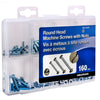When you're dealing with allergies or have pets at home, ensuring the air quality inside your home is essential. One of the simplest ways to improve indoor air quality is by selecting the right furnace filters. The correct furnace filter can make a significant difference in reducing allergens and pet dander, providing a healthier environment for you and your loved ones.
Understanding Furnace Filters
Furnace filters play a crucial role in maintaining clean air in your home. They trap dust, pollen, pet dander, and other airborne particles, preventing them from circulating through your HVAC system and back into your living spaces. With various types and ratings available, understanding what to look for in furnace filters can be overwhelming. Here’s how you can choose the best one for allergies and pets.
Key Features to Consider
1. MERV Rating
The Minimum Efficiency Reporting Value (MERV) rating tells you how effectively a filter captures particles. For households with allergies or pets, it is advisable to select a filter with a MERV rating between 8 and 13. Filters within this range are more efficient in capturing smaller particles, including pet hair and allergens.
2. HEPA Filters
High-Efficiency Particulate Air (HEPA) filters are the gold standard for air purification. While not all HVAC systems are compatible with HEPA filters, if your system allows it, they are highly effective in capturing smaller allergens and particles, making them an excellent choice for those with allergies or multiple pets.
3. Material of the Filter
Most common furnace filters are made from polyester or fiberglass. While both have their merits, pleated polyester or cotton filters are generally more efficient at trapping dust, allergens, and pet dander compared to traditional fiberglass filters. Pleated options provide a larger surface area for capturing particles and typically have a longer lifespan.
4. Frequency of Replacement
Ensure that you are replacing your furnace filters regularly. For homes with pets or allergy sufferers, check the filter every month and replace it at least every 3 months, or more frequently if necessary. Clean filters work more efficiently and ensure that your HVAC system functions optimally.
Making the Right Choice for Your Home
Choosing the right furnace filter is about striking a balance between cost, efficiency, and the specific needs of your household. Always consult your HVAC system’s manual to ensure compatibility with higher-rated or HEPA filters.
By taking the time to research and invest in the right furnace filters, you can significantly enhance the air quality of your home, reduce allergy symptoms, and create a safer environment for your pets. For more information on furnace filters and other air quality solutions, visit XPartSupply.







